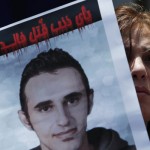Neglecting Freedom Abroad
 Three weeks ago, Egyptian police brutally beat a young political activist to death. Yet Obama refuses to raise the case with Egyptian authorities.
Three weeks ago, Egyptian police brutally beat a young political activist to death. Yet Obama refuses to raise the case with Egyptian authorities.
Three weeks ago, Egyptian police brutally beat a young political activist to death outside of an Internet café in Alexandria, Egypt. The activist, Khaled Said, had stoked the officers’ ire by obtaining a video that showed police officers selling drugs.
Within days, photos depicting Said’s mangled corpse were circulated via e-mail and Facebook throughout the country, causing an uproar. A major protest was held in Alexandria, drawing approximately 3,000 individuals, while smaller protests were held around the country. Most notably, Mohammed ElBaradei, the former International Atomic Energy director widely expected to run for president in 2011, joined the demonstrators.
Yet the Egyptian regime held firm. It surrounded the protests with soldiers. It arrested demonstrators at the smaller protests, and sentenced one organizer to six months in prison. The Ministry of the Interior then released an official report of Said’s death, claiming – incredibly, and in contrast to multiple eye-witness testimonies – that he had choked on a bag of drugs. And when activists protested the government-run newspaper al-Gomhuria for “defending the government blindly,” al-Gomhuria ran a front-page headline accusing them of “attempted terrorism.” Indeed, in the twisted logic of authoritarianism, protests against violence equal violence.
This is what non-democratic, unfree rule looks like: sporadically violent and constantly in denial. So on July 4th in Egypt, I am thankful for my freedom (as well as my blue, eagle-embossed passport), in part because I have observed life without it.
To be sure, had our forefathers been too afraid to sign the Declaration of Independence 234 years ago, America would have probably been freer than Egypt. King George III was a tyrant, but he was no Hosni Mubarak. (Yes, I’ll take the sugar tax over Egypt’s emergency laws any day.)
But precisely because our forefathers signed the Declaration, America remains the most potent symbol of freedom in the world. Even in Egypt, where people never miss an opportunity to criticize American foreign policy, they routinely praise America’s system of government. For pro-democracy activists in particular, the American example has long been a source of inspiration.
That, however, may be changing. Indeed, President Obama finds even this kind of American exceptionalism too particularistic, too jingoistic, and too Bush. So he has replaced inspiration with what he calls “realism”: hugs before human rights in Venezuela; climate change before human rights in China; and budget-cutting before human rights in Iran (and only Iran).
Meanwhile, others are picking up the slack. Last week, European Union ambassadors issued a joint statement expressing their concern over Khaled Said’s death and, on Saturday, the Egyptian regime finally responded by sending two policemen to trial on torture charges. As usual, the Obama administration has kept to the sidelines, denying any contact with the Egyptian government regarding this issue.
On this July 4th, we can do better. We always have.